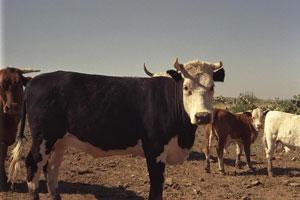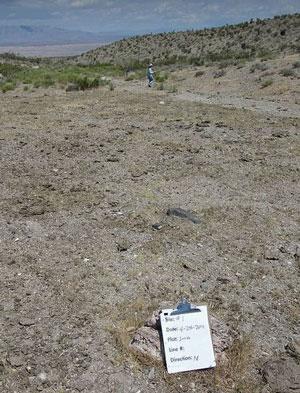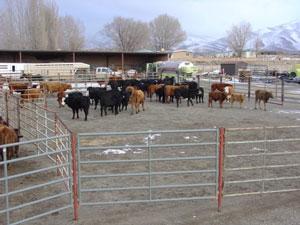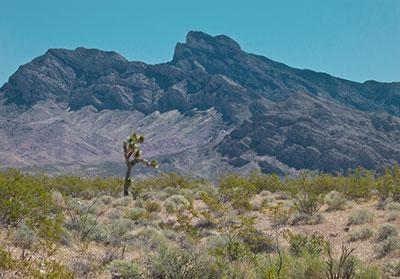In a situation that reads like a bad plot from an old western movie, officials with the Bureau of Land Management and Lake Mead National Recreation Area are hoping for a peaceful resolution of a cattle trespass dispute with a Nevada rancher that has lasted more than 20 years. It's a tense and tricky situation.
What's going on the desert northeast of Las Vegas?
The answer goes all the way back to the 1800s, when parts of the West were settled by ranchers who controlled vast areas of open range simply by securing relatively small tracts that included scarce and essential water sources'and then grazing their livestock on the adjoining land.
As more settlers looking for their own land arrived, open range was often overgrazed, disputes arose, and the resulting conflicts provided fodder for many a western novel and movie. Order was eventually secured by a combination of land surveys to define property lines, systems such as the Homestead Act to allow orderly transfer of public land to private ownership, and institutions such as courts and law enforcement to keep the peace.
Grazing Leases and the Bureau of Land Management
Public land which was not legally converted into private ownership remained in the public domain, and some ranchers continue to use public property to supplement their private range. Much of that public land is being managed today by the U. S. Bureau of Land Management (BLM), and that agency faces a challenging and often controversial task: "to manage and conserve the public lands for the use and enjoyment of present and future generations under our mandate of multiple-use and sustained yield."

The BLM manages grazing permits on public land all across the West. BLM photo.
One of those "multiple uses" is grazing, and a dispute between a rancher named Cliven Bundy and the BLM over the use of land in southern Nevada has lasted for more than 20 years. The former grazing lease, known as the Bunkerville allotment, includes public land managed by both the BLM and National Park Service at Lake Mead National Recreation Area, with the BLM handling grazing issues for the NPS.
"Multiple Use" Can Lead to Conflicts
A mandate to manage large areas of land for such diverse uses as grazing, wildlife, recreation, mining, timber and energy development often leads to conflicts, and that's the case on the Bunkerville allotment.
Beginning in 1993, the BLM informed Mr. Bundy about limits on the number of cattle he could graze on the allotment in order to meet regulations to protect wildlife, particularly a threatened species, the desert tortoise. Mr. Bundy refused to accept the limits and stopped paying the required fees for his grazing permit ... but continued to run his cattle on the property.
The BLM subsequently cancelled the grazing permit, and in 1997, Clarke County, Nevada, purchased all the active grazing permits in the area to conserve them for wildlife needs. A tentative proposal was made to Mr. Bundy to compensate him for any stock water rights or range improvements he might have in his former allotment. He rejected the offer...and continued to run his cattle.
Failed Negotiations Lead To Court Cases
After further attempts to negotiate with Mr. Bundy failed, a series of court cases that extended up to the Ninth Circuit Court of Appeals upheld an injunction which permanently enjoined Mr. Bundy from grazing cattle on the Bunkerville allotment, and ordered him to remove all trespass cattle. He refused, despite notices that the livestock would be subject to impoundment and removal if they remained.
While the legal wrangling continued, the number of cattle in the area continued to grow. In 1999, the BLM was able to document 51 head of Bundy cattle on federal range in the allotment; by 2011, over 900 cattle were counted by a helicopter survey of the rugged terrain.
Mr. Bundy apparently concedes that he has never owned any of the land in question, but disputes the BLM's jurisdiction; he contends he has the right to continue to use the property, since his family has been doing so since the 1880s.

Damage to soil and vegetation from concentrated use by trespass cattle in the former Bunkerville Allotment. BLM photo.
The BLM Still Manages Lots of Grazing Permits
The BLM has taken pains to point out that it is not anti-grazing, noting that it "administers approximately 18,000 grazing permits and leases on 157 million acres of public lands..."Ranching continues throughout Southern Nevada on public and private lands," the agency notes. "BLM currently has three active grazing allotments on more than 100,000 acres of public lands in Southern Nevada."
Kirsten Cannon, spokeswoman for the Nevada BLM office in Reno, says, 'His cattle have been illegally trespassing on federal land for two decades and it's just unfair for those who ranch in compliance,' she said. 'We made repeated attempts to resolve this. The courts have ordered him to move his cattle. Now we've reached the last resort, which is impoundment.'
You can read a summary of the history of the dispute at this BLM link, and the agency, under increasing pressure from other local landowners and conservation groups, has decided it's time to remove the cattle and resolve the issue.
There's no doubt that Mr. Bundy has flouted the legal system for years, but you might wonder what else is at stake in this situation.
A Long List of Problems Caused by Trespass Livestock
The BLM cites a long list of problems caused by Mr. Bundy's cattle. Among the issues are damage by the cattle to springs and vegetation on public land and trampling of artifacts at cultural sites. Crops on adjacent private property have been damaged by foraging livestock, and residents of the communities of Bunkerville and Mesquite have complained about the impact of trespass cattle on city facilities, including the Mesquite Heritage Community Garden and the Mesquite golf course.
If you've even been around cattle which aren't accustomed to being "worked" regularly by humans, you'll understand the safety concerns for visitors and employees using the BLM and park lands in question. According to the BLM, "a State of Nevada employee at the Overton Wildlife Refuge has been attacked by a Bundy bull, and a feral cow was hit by an automobile within Lake Mead National Recreation Area. Cattle are frequently seen on public roads, including State Route 170, and pose a danger to vehicles and to members of the public traveling on public roads."
There have been other economic costs from the trespass livestock. The Nevada State Department of Wildlife has had to build extensive fences to protect state and federal lands in the Overton Wildlife Refuge from the cattle. The Walton Family Foundation had offered $400,000 for a matching grant to restore wildlife habitat in the area, but has withdrawn the funds until the trespass cattle have been removed. It's a reasonable decision; restoration efforts would be a waste of money as long as the cattle continue to roam and damage the area.
Two Decades of Waiting May Be Coming to an End
So, what's next?

These trespass cattle, removed off public land in northern Nevada, are being cared for until they are claimed and fines/impoundment fees are paid. BLM photo.
According to a statement from Lake Mead National Recreation Area, "The BLM and NPS have made repeated attempts to resolve this matter administratively and judicially. Impoundment of cattle illegally grazing on public lands is an option of last resort. The BLM and NPS are working closely with local, state and federal officials to ensure the gather of unauthorized cattle occurs in a safe and orderly manner."
During what will undoubtedly be a challenging roundup, the area involved will be closed to public use from March 27 through May 12. The park website notes, "Only a small portion of the northern and eastern part of the park will be temporarily closed, and Echo Bay, Stewarts Point, Redstone and the hot springs along Northshore Road remain open." You can view a map of the area within the park involved in the closure at this link.
Bundy's Response
So, what's Mr. Bundy's reaction to the latest developments? That's a cause for concern, and at least part of the reason for the closure of the area to the public during the impending roundup.
A previous roundup scheduled for 2012 was cancelled due to fears of a violent confrontation with Bundy, and the BLM opted for one more try at a solution in the courts. That cancellation in turn brought threats of a lawsuit against the BLM from an environmental group, for failure to enforce court orders to remove the livestock. In 2013, the BLM prevailed once again in court.
Bundy's response to the numerous court orders to remove his cattle has been succinct. "At first I said, 'No,'" he told The Los Angeles Times last year, "Then I said, 'Hell, no.'"
"I've got to protect my property," Bundy told the Times. "If people come to monkey with what's mine, I'll call the county sheriff. If that don't work, I'll gather my friends and kids and we'll try to stop it. I abide by all state laws. But I abide by almost zero federal laws."
The County Sheriff Urges A Peaceful Solution
It doesn't appear the county sheriff plans to intervene on the Bundys' behalf. According to Carol Bundy, the rancher's wife, 'We want him to step in and tell these federal characters that 'This is Clark County, Nevada, land and you have go through me to get these cattle.' But we have not heard a word.'
For his part, Clark County Sheriff Doug Gillespie understands the days of the 19th century range wars are long past. The Las Vegas Review-Journal quoted Gillespie as saying: 'I'm always concerned when there are situations like this where there is so much emotion. I hope calmer heads will prevail like they normally do. You're talking about rounding up cattle. You have to keep that in perspective. No drop of human blood is worth spilling over any cow, in my opinion.'
He absolutely right. Let's hope everyone else involved in this situation agrees.




Comments
Kurt, I never said or thought he was a hero or right. I am solely concerned about the way my federal government continually has these poor action plans and tries to justify their militarized and "species protection" bullying.
Lots of emotional issues involved here. The image of the rugged cowboy and rancher still strikes a chord with many Americans – and Bundy has played that image to the hilt. I can certainly sympathize with responsible ranchers who have paid their grazing fees and relied on cheap public grazing land for decades, and who see their way of life threatened by increased demands for other uses for that same public land.
However, as time passes and the nation's population grows, the "best uses" for some of that public land may change. As pointed out in the original story above, there are rarely any easy answers when "multiple uses" (in this case, grazing vs. wildlife habitat) collide.
A 2012 Dept. of Interior report cited here illustrates the competing economic forces at work on public lands: "Grazing on BLM Public Lands Accounts for only 0.41% of the nation’s livestock receipts and only 17,000 jobs. In contrast, recreation accounts for 372,000 jobs and contributes $45 billion to the economy." You may question the exact numbers cited, but the differences in magnitude remain.
The pressure on the BLM over conflicting uses will likely only grow, and when a user such as Bundy doesn't agree with decisions by managing agencies, there are legal avenues for appeal. Bundy did so, and lost, mutiple times, and at that point his wishes or opinions don't justify armed resistance to the rule of law.
The Nevada Cattlemen's Association (NCA), while expressing sympathy for Bundy's situation and disagreeing with the BLM's decision to reduce the number of cows Bundy could graze on public land, recognizes the correct process to resolve such disputes. It said in a recent statement, "... in accordance with the rule of law, we must use the system set forth in our Constitution to change those laws and regulations. Nevada Cattlemen's Association does not condone actions that are outside the law in which citizens take the law into their own hands..."
"...This case was reviewed by a federal judge and a decision was rendered to remove the cattle. Nevada Cattlemen's Association does not feel it is our place to interfere in the process of adjudication in this matter. Additionally, NCA believes the matter is between Mr. Bundy and the Federal Courts."
The courts have spoken clearly, multiple times, and have ordered Bundy to remove his cattle. He's refused,and has mounted violent resistance to our legal system. That being the case, it's very hard to find any "BLM overreach" in this specific situation.
Beach, the guy went 20 years without paying for his grazing allotment (to the tune of $1 million) with court rulings against him. And the time-line shows Bundy was given plenty of notice to move his cattle before the BLM arrived to round them up. Where's the bullying?
In August 2013 he was served with a federal court order giving him 90 days to move his cattle. In October 2013 a federal judge told him not to interfere with any seizure of his cattle. In March the BLM sent him notice that they were going to impound his cattle if they weren't moved off the land in question.
As for a poor action plan, could anyone have predicted the estimated 1,000 or so gun-toting "militiamen" who showed up to side with Bundy. Are you concerned about their actions?
Texas Land Grab:
"Texas Attorney General Greg Abbott is the latest state official asking that question in relation to a looming U.S. Bureau of Land Management decision about what to do with a swath of federal and American Indian land in Kansas, Oklahoma and Texas -- including the acreage in Texas along a 116-mile stretch of the Red River."
So, the BLM is looking at FEDERAL and AMERICAN INDIAN land. NOT A LAND GRAB.
"On Tuesday, Abbott sent a letter to Neil Kornze, BLM director, seeking information about the agency's plans for the land, some of which North Texans have long considered theirs, using it for cattle grazing and growing crops."
So, some Texans, who have been using the land (not owning it) are wondering what is going to be done with the land (they don't own).
""Private landowners in Texas have owned, maintained, and cultivated this land for generations. Despite the long-settled expectations of these hard-working Texans along the Red River, the BLM appears to be threatening their private property rights by claiming ownership over this territory," wrote Abbott, the Republican candidate for governor."
Wait, how can they OWN land OWNED by someone else? Just because Abbott, who is running for Governor, says its theirs?
"For what it's worth, BLM regional spokesman Paul McGuire responded to Abbott's concerns:
The BLM is categorically not expanding federal holdings along the Red River. The 140 acres in question were determined to be public land in 1986 when the U.S. District Court ruled on a case brought by two private landowners, each seeking to adjust boundary lines for their respective properties. The BLM was not party to any litigation between the landowners. The 140 acres were at no time held in private ownership. [BLM]"
Abbott of course, is screaming that it is 90,000 acres because, well, it sounds so much better that way. In the meantime, he just confiscated 1700 acres and has helped private companies such as Trans-Canada use Eminent Domain to confiscate even more. Of course, that is nothing new in Texas, where governors and the government has been doing it for years to their advantage (check out George Bush's baseball stadium).
Jim, you may need to have your vision checked. The BLM's establishment of little fenced off "First Amendment Area" is a very serious overreach in this specific situation. I have always thought the area between Canada and Mexico was the First Amendment area?
And when in the hell has the DOI put recreation ahead of anything, you must be kidding me!
I understand your reason for skepticism about BLM's interest in recreation, although the folks at that agency would probably take exception to your lack of respect for their recreational opportunities :-) http://www.blm.gov/wo/st/en/prog/Recreation.html
They offer a number of campgrounds, for example, and another frequent visitor to this site should be pleased to note the BLM does not charge any fees for backcountry camping, which they refer to as "dispersed, primitive camping." For better or worse, there seems to be quite a bit of public use of the BLM's areas for ORV use and mountain biking in places like California and Utah. At least that takes some pressure off of NPS lands.
The BLM also manages "221 Wilderness Areas with 8.7 million acres in 10 Western States (3 percent of BLM's total acreage in the coterminous United States. " http://www.blm.gov/wo/st/en/prog/blm_special_areas/NLCS/Wilderness.html
Your comment is a good illustration of my point that there is quite a bit of disagreement about how the BLM should meet it's "multiple use" mandate - and which uses should receive priority.
At least the BLM allows people to recreate on their land.
http://politicalticker.blogs.cnn.com/2014/04/24/politicians-denounce-bun...
April 24th, 2014
12:00 PM ET
21 minutes ago
Politicians denounce Bundy's racist remarks
Posted by
CNN's Ashley Killough and Paul Steinhauser and Leigh Ann Caldwell
Updated 9:29 p.m. ET 4/24/2014
(CNN) - What started out as a standoff over land rights may be turning into a controversy over race.
Racist comments from Nevada rancher Cliven Bundy - who earlier this month appeared to win a highly publicized standoff against federal authorities over his two-decade long illegal grazing of cattle on public land - are giving Democrats a new weapon to attack some top Republicans who earlier came to Bundy's defense.
And the controversial comments also call into question moves by Fox News and some other conservative media that highlighted the story and painted Bundy as a hero in his battle against federal authorities.
Bundy, 67, won his standoff against federal rangers after armed militiamen came to his side. Even with the incident over, Bundy continued to talk to a dwindling crowd of media from his ranch, about 100 miles northeast of Las Vegas.
The comments that sparked the latest controversy came this weekend when Bundy recalled to supporters about a time he drove by a public-housing project in North Las Vegas, according to a report from The New York Times.
"I want to tell you one more thing I know about the Negro," Bundy said, "and in front of that government house the door was usually open and the older people and the kids - and there is always at least a half a dozen people sitting on the porch - they didn't have nothing to do. They didn't have nothing for their kids to do. They didn't have nothing for their young girls to do.
"And because they were basically on government subsidy, so now what do they do?" Bundy continued. "They abort their young children, they put their young men in jail, because they never learned how to pick cotton. And I've often wondered, are they better off as slaves, picking cotton and having a family life and doing things, or are they better off under government subsidy? They didn't get no more freedom. They got less freedom."
What Cliven Bundy's comments on race reveal
In a press conference Thursday, Bundy defended and repeated his comments but emphasized he was merely "wondering" whether African-Americans were better off as slaves.
"And that's a question I put before the world: Are they better, or were they better then? I'm not saying I thought they should be slaves, or I wasn't even saying they was (sic) better off; I'm wondering if they're better off," he said.
Bundy said he questions whether those living under government subsidies are living as slaves to the state, but denied he held racist views.
"I might not have a very big word base or vocabulary, I guess, but let me tell you something: When I say slavery, I mean slavery...Slavery is about when you take away choices from people, and where you have forced labor," he said. "You think that's what I'm about, America? If it is, you're sure wrong, because I don't believe in any type of that stuff."
And Bundy didn't back down in an interview Thursday night with CNN's Bill Weir. He questioned whether blacks are better off now when "they don't have nothing to do with their children, their family unit is ruined (and) I don't think they have the life that they should have."
"I don't think I'm wrong," he told CNN, insisting that he'd spoken "from my heart." "I think I'm right."
'Comments are completely beyond the pale'
"Every Republican elected official who risked inciting violence to gain political capital out of Cliven Bundy now owes the people of Nevada an apology for their irresponsible behavior of putting their own political future ahead of the safety of Nevadans," added the Nevada Democrats.
Some top national Republicans quickly condemned the remarks.
Sen. Rand Paul, who originally supported Bundy's case, issued a statement Thursday morning decrying Bundy's racial comments.
"His remarks on race are offensive and I wholeheartedly disagree with him," said the Kentucky Republican, who's seriously considering a 2016 presidential run.
GOP Sen. Dean Heller of Nevada, who earlier called his supporters "patriots", also "completely disagrees with Mr. Bundy's appalling and racist statements, and condemns them in the most strenuous way," according to his spokesperson, Chandler Smith.
Republican National Committee Chairman Reince Priebus, who had not previously weighed in on the land dispute, said in a statement that "Bundy's comments are completely beyond the pale. Both highly offensive and 100% wrong on race."
Democrats had already been on the attack against Bundy before his racial comments. Senate Majority Leader Harry Reid - Nevada's senior senator - last week blasted Bundy's supporters as "domestic terrorists," saying they were arming themselves with automatic weapons and positioning "snipers in strategic locations."
One man, former Arizona sheriff Richard Mack told a reporter the militia were considering putting "all the women" on the front lines.
"If they're going to start shooting, it's going to be women that are going to be televised all across the world getting shot by these rogue federal officers," he said.
Read more...